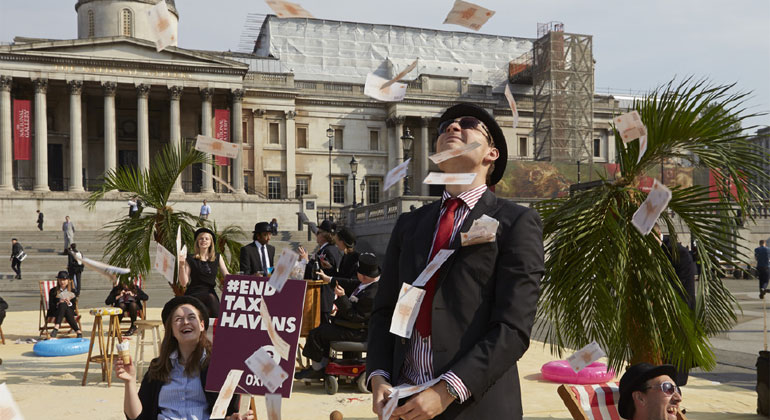Five steps governments can take to stop another Paradise Papers scandal
Governments must take five immediate steps to stop corporations and the super-rich cheating poor countries out of over $170 billion in tax revenues every year, said Oxfam today in the wake of the Paradise Papers leak.
Oxfam’s new briefing paper, ‘Stopping the Scandals,’ assesses why international tax reforms have failed. It offers solutions to the Paradise Papers scandal, which exposes tax dodging on an industrial scale, and a new study by economist Gabriel Zucman. Zucman estimates that multinational companies artificially shift almost half of their total profits – 45 percent – to tax havens.
Tax dodging is fuelling an inequality crisis where just eight men now own the same wealth as half the world. When corporations and the super-rich dodge taxes, it is ordinary people, and especially the poorest, who pay the price as governments balance the budget by raising their taxes and cutting vital public services.
Poor countries are particularly hard hit by corporate tax dodging as they are twice as dependent on corporate tax revenues as rich countries. Of the $170 billion poor countries lose in tax revenues every year, $100 billion is through corporate tax dodging. This money could provide an education for 124 million children and pay for healthcare services that could prevent the deaths of at least six million children annually.
Susana Ruiz, Oxfam’s tax advisor, said:
“The Panama Papers galvanized politicians to act, but the Paradise Papers show they have much more to do. The super-rich and corporations, such as Apple and Nike, aided and abetted by tax havens and offshore companies like Appleby, will always be one step ahead of the game unless governments make fundamental changes to the tax system.
“Stopping the tax scandals won’t be easy but it is not impossible if the political will is there. Oxfam’s five-point plan shows how governments can stop the tax scandals if they put the interests of the public over the demands of the super-rich and big business.”
Oxfam’s 5-point plan to stop the scandals calls on governments to:
- Agree a global blacklist of tax havens based on comprehensive objective criteria and take strong countermeasures including sanctions to limit their use. Governments have yet to agree an objective global list of tax havens. A farcical OECD – G20 blacklist published in June 2017 features just Trinidad and Tobago. A more comprehensive European Union list, due to be published in December, will omit European tax havens such as the Netherlands and Ireland that have been key players in the Paradise Papers scandal.
-
Create a global tax body where all countries can work together on an equal footing to agree the fundamental tax reforms that are needed to ensure the tax system works for everyone. International tax reforms done little to prevent tax dodging in rich countries and even less in poor countries which were denied any real say in the reform process. Yet OECD and G20 member countries have blocked attempts by poor countries to create an independent tax body where all countries can work together to agree a second round of more fundamental reforms. This would include action to combat damaging tax competition.
- Rebalance tax deals by making sure tax treaties do not exploit developing countries tax bases. Poor countries often lose out from unfair tax agreements because they allow multinational companies to avoid paying tax in the country. Yet, international tax reforms led by the G20 and OECD ignored this issue – in part because poor countries were denied any real say in the process.
-
End tax secrecy for the super-rich by establishing a centralized public register of the individuals who own and benefit from shell companies, trusts and foundations publicly available. Many countries have established registers of ‘beneficial owners but few have made the information publicly available. This means poor countries are unable to access the information to identify tax dodgers.
-
End corporate tax secrecy by ensuring all multinational companies make financial reports publicly available for every country where they operate. The OECD initiative on country-by-country reporting falls well short of the mark as it does not cover all multinational corporations and it does not require companies to make their financial reports publicly available. This means poor countries are unable to access the information to identify tax cheats. Stronger European proposals on public country-by-country reporting, were due to be agreed this year, but are being blocked by EU member states such as Germany, Ireland, and Luxembourg.








